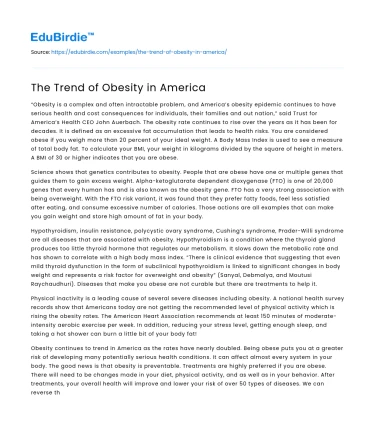“Obesity is a complex and often intractable problem, and America’s obesity epidemic continues to have serious health and cost consequences for individuals, their families and out nation,” said Trust for America’s Health CEO John Auerbach. The obesity rate continues to rise over the years as it has been for decades. It is defined as an excessive fat accumulation that leads to health risks. You are considered obese if you weigh more than 20 percent of your ideal weight. A Body Mass Index is used to see a measure of total body fat. To calculate your BMI, your weight in kilograms divided by the square of height in meters. A BMI of 30 or higher indicates that you are obese.
Science shows that genetics contributes to obesity. People that are obese have one or multiple genes that guides them to gain excess weight. Alpha-ketoglutarate dependent dioxygenase (FTO) is one of 20,000 genes that every human has and is also known as the obesity gene. FTO has a very strong association with being overweight. With the FTO risk variant, it was found that they prefer fatty foods, feel less satisfied after eating, and consume excessive number of calories. Those actions are all examples that can make you gain weight and store high amount of fat in your body.
Hypothyroidism, insulin resistance, polycystic ovary syndrome, Cushing’s syndrome, Prader-Willi syndrome are all diseases that are associated with obesity. Hypothyroidism is a condition where the thyroid gland produces too little thyroid hormone that regulates our metabolism. It slows down the metabolic rate and has shown to correlate with a high body mass index. “There is clinical evidence that suggesting that even mild thyroid dysfunction in the form of subclinical hypothyroidism is linked to significant changes in body weight and represents a risk factor for overweight and obesity” (Sanyal, Debmalya, and Moutusi Raychaudhuri). Diseases that make you obese are not curable but there are treatments to help it.
Physical inactivity is a leading cause of several severe diseases including obesity. A national health survey records show that Americans today are not getting the recommended level of physical activity which is rising the obesity rates. The American Heart Association recommends at least 150 minutes of moderate-intensity aerobic exercise per week. In addition, reducing your stress level, getting enough sleep, and taking a hot shower can burn a little bit of your body fat!
Obesity continues to trend in America as the rates have nearly doubled. Being obese puts you at a greater risk of developing many potentially serious health conditions. It can affect almost every system in your body. The good news is that obesity is preventable. Treatments are highly preferred if you are obese. There will need to be changes made in your diet, physical activity, and as well as in your behavior. After treatments, your overall health will improve and lower your risk of over 50 types of diseases. We can reverse the trend by making healthy lifestyle choices.






 Stuck on your essay?
Stuck on your essay?

